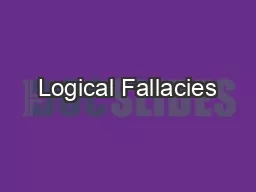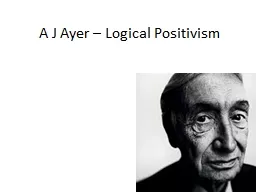PPT-Ch. 7 – Logical Agents
Author : celsa-spraggs | Published Date : 2017-04-17
Supplemental slides for CSE 327 Prof Jeff Heflin GoalBased Agent sensors actuators Agent Environment What the world is like now What action I should do now Goals
Presentation Embed Code
Download Presentation
Download Presentation The PPT/PDF document "Ch. 7 – Logical Agents" is the property of its rightful owner. Permission is granted to download and print the materials on this website for personal, non-commercial use only, and to display it on your personal computer provided you do not modify the materials and that you retain all copyright notices contained in the materials. By downloading content from our website, you accept the terms of this agreement.
Ch. 7 – Logical Agents: Transcript
Download Rules Of Document
"Ch. 7 – Logical Agents"The content belongs to its owner. You may download and print it for personal use, without modification, and keep all copyright notices. By downloading, you agree to these terms.
Related Documents














